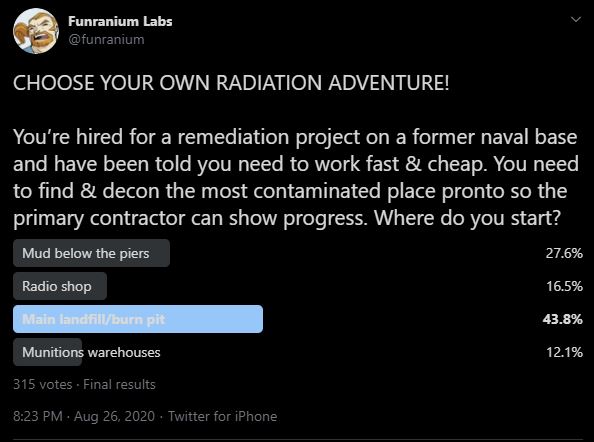Well folks, you did it. You all have a future as remediation contractors. Go get yourself some licenses, equipment, and hire some workers that you, personally, absolutely never have to suit up do this work.
Oh wait, the money is thin. Welp, looks like you are.
This is a general case scenario. While many people jumped to the immediate conclusion that we’re discussing Hunter’s Point and Tetratech, I want to make it clear that this applies to pretty much every country with a navy. Some countries have had extra decades to be messy. There’s some qualities that make a given naval base nastier than others from a radiological point of view:
• Length of operation
• Diversity of operation
• Having a nuclear navy
• Onsite reactor
• Naval research lab
So, you might think that this means that the UK’s yards at Portsmouth are the worst. Nah, they’re merely the UK’s oldest, continuously operating since [checks notes] the Third Crusade. Faslane, on the other hand, is likely more interesting for rad. Then, hooboy, there’s places like Murmansk. Thus, for radiological contamination issues around your naval base, you’re looking for a period of operation that spans roughly 1900-2000 for prime, extensive, and careless use/discarding of radioactive materials by 16-25 year olds wearing funny uniforms… and military contractors. And I only end that year range at 2000 because, GENERALLY SPEAKING, we’ve collectively stopped doing things like throwing waste barrels overboard while at sea and then sending bosuns out with shotguns to shoot them and make sure they sink.
You’ve been asked to make an important rad contamination find quickly and cheaply. You’ve been hired as a subcontractor because you know something about where to find stuff and the primary PM doesn’t. Hence the choices presented in this poll. You are damn near guaranteed to find rad contamination in ANY of the four choices I gave you. The question is which will give you employer the win they’re looking for, fast, without bankrupting/killing yourself. The easy choice, if you have a nuclear navy, is go check the mud below where you docked the rust buckets. Like looking for leaking fluids under your car in the garage.
The problem is that doing anything on the water add a minimum x5 cost multiplier. For pretty much everything. There’s an old sailor’s joke of :
Q: What’s the difference between that speaker and the marine one?
A: I paid 10x the price for the marine speaker before pouring a glass of saltwater in it.
Except now apply it to all your testing equipment. Oh, you need a boat. Maybe SCUBA gear too. This is also going to be our first encounter with the most serious problem in remediation. You’re looking for rad to clean up, but you’re also likely to find things you weren’t looking for. Things you’d hope weren’t there. Things that aren’t remotely documented. Like mines. That’s an extreme example but timeless terrors lay beneath the waves awaiting the unsuspecting and incautious. Like dioxin slicks, lost mercury ballast slowly turning into methylmercury, etc. You really shouldn’t go fishing here unless you’re doing biological sampling. Eventually the primary will need to go decon the harbor, but that is a hugely, massively expensive project. That will come much later, if ever. Here, have my cranky thoughts about how we never finish anything.
Instead, rather than hitting the waves, you go for the nice clean munitions warehouses. Well, probably clean. You should ask some questions about them, starting with:
Q: What did you store in here?
A: Stuff. And things.
Yeah, it’s kinda goes like that. This is about as much detail as you’re going to get on your building history research from the navy. Have you ever noticed how large they are? Really, really big. Also, have you noticed that there’s a lot of them? Unless you hire a small army of a sampling and remediation crew, you’re going to spending a long time try to cover all of them. You missed the time milestone and are bankrupt.
The place to go as a wise subcontractor for the cheap, fast win is to ask where the Radio Shop was. This may sound odd, but the term “Radio Shop” conceals the unbelievable mission creep that these spaces took on through the 20th century. Yes, at first, they took care of radios. This requires having a long historical perspective. The militaries of the world absolutely jumped on radio as the magic technology to clear up the fog of war as soon as they hit the scene. Radio was a cutting edge and rapidly advancing technology. Wrangling the constantly changing tech and the ridiculous demands of ignorant superiors to make it all do the impossible…this may sound familiar to any network engineer. The denizens of the Radio Shop were some of the brightest, most technically savvy people on the entire base.
There is no inspiring specific incident to point to for this scenario I just walked you through other than ALL OF THEM, EVERYWHERE. This is why naval bases rarely get decommissioned, not entirely, usually because the chemical nightmares are so much worse.
I am not picking on navies because they are the worst. No base from any military branch is without sin. Some are cleaner than others but I think that’s probably more due to a lack of opportunity to be worse. Some branches (ahem, USAF) made up for lost time.
~fin~
